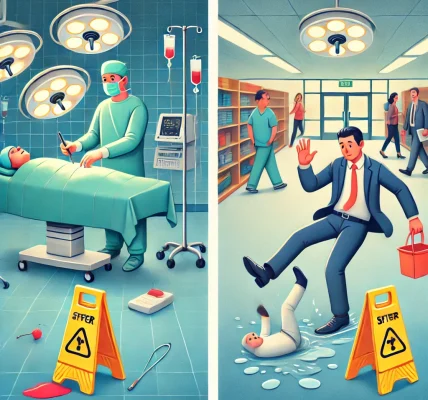Introduction
If you’ve been injured due to someone else’s negligence, you may be faced with a crucial decision: Should you accept a settlement or take your case to trial? Understanding the pros and cons of each option is essential to maximizing your compensation while avoiding unnecessary risks. While a settlement offers quicker resolution and guaranteed compensation, a trial may lead to higher payouts but comes with uncertainties.
This guide will help you determine when to accept a settlement and when to proceed to trial in a personal injury case.
Understanding a Settlement vs. a Trial
What Is a Settlement?
A settlement is an agreement between the injured party (plaintiff) and the at-fault party (defendant), usually facilitated by their insurance company. The defendant offers a sum of money to resolve the case **without going to **
What Is a Trial?
A trial is a legal proceeding where a judge or jury examines evidence and determines the compensation amount. This process is public, time-consuming, and riskier, but it may result in a larger payout if the case is strong.
When to Accept a Settlement
1. When the Offer Covers Your Damages
If the insurance company or defendant offers a settlement that fully compensates your medical bills, lost wages, pain and suffering, and future expenses, accepting it may be the best option.
2. When Liability Is Clear
If the other party admits fault and offers a fair settlement, going to trial may not be necessary. A trial is best when there is a dispute over liability.
3. When You Want a Faster Resolution
Trials can take months or even years to conclude. If you need immediate compensation for medical expenses or lost income, settling might be the best option.
4. When You Want to Avoid Legal Fees
Although most personal injury attorneys work on contingency (they get paid only if you win), trial costs such as expert witnesses, court fees, and depositions can be expensive. If a fair offer is on the table, settling may save you money in the long run.
5. When You Want to Avoid Stress and Uncertainty
Trials can be emotionally and mentally exhausting. If you want to avoid the stress of cross-examinations, long court battles, and unpredictable jury decisions, accepting a fair settlement may be wise.
6. When the Defendant Has Limited Financial Resources
If the at-fault party has limited insurance coverage or assets, a settlement ensures you get compensated without the risk of the defendant being unable to pay after trial.
When to Go to Trial
1. When the Settlement Offer Is Too Low
Insurance companies often lowball initial settlement offers to save money. If the offer does not adequately cover your damages, you may need to go to trial to seek fair compensation.
2. When Liability Is Disputed
If the defendant denies responsibility or blames you for the accident, a trial may be necessary to prove your case with evidence and expert testimony.
3. When You Have Strong Evidence
If you have clear medical records, eyewitness statements, photos, video footage, and expert testimonies, you have a better chance of winning a larger award in court.
4. When You Want to Seek Punitive Damages
In some cases, especially those involving gross negligence, reckless behavior, or intentional harm, a court may award punitive damages in addition to compensatory damages. Settlements rarely include punitive damages.
5. When the Defendant Has Significant Financial Resources
If the defendant is a large corporation, hospital, or government entity with deep pockets, they may have the means to pay a much larger verdict than they initially offer in settlement.
6. When Setting a Legal Precedent Is Important
If your case involves an issue of public interest or corporate wrongdoing, taking it to trial could create a precedent that benefits future victims.
Pros and Cons of Settlement vs. Trial
| Factor | Settlement | Trial |
|---|---|---|
| Time | Faster (weeks/months) | Longer (months/years) |
| Compensation | Lower but guaranteed | Higher potential but uncertain |
| Stress & Effort | Lower stress | Higher stress (courtroom battle) |
| Legal Fees | Lower costs | Higher costs (expert witnesses, court fees) |
| Public vs. Private | Private | Public record |
| Appeal Option | No appeal | Possible appeals, delaying resolution |
How to Make the Right Decision
Deciding between a settlement and a trial depends on several factors:
- Consult an Attorney: A personal injury lawyer can evaluate your case and negotiate a better settlement or fight for you in court.
- Assess Your Evidence: If your case is strong, a trial may be worth the risk.
- Consider Your Financial Needs: If you need compensation quickly, a settlement may be the better option.
- Weigh the Risks: Trials are unpredictable. If you prefer certainty, settling might be safer.
- Understand the Long-Term Impact: A quick settlement might be tempting, but if your injuries require ongoing care, you need to ensure the offer is sufficient.
Conclusion
There is no one-size-fits-all answer to whether you should settle or go to trial. It depends on the strength of your case, your financial situation, and your willingness to take risks. If the insurance company offers a fair settlement, accepting it can save you time, money, and stress. However, if the offer is unreasonably low or liability is disputed, taking the case to trial might be necessary to secure fair compensation.
Before making a decision, consult an experienced personal injury attorney who can guide you through the process and help you make the best choice for your situation.




